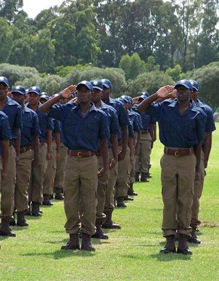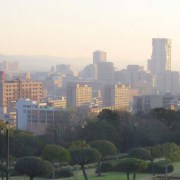|
Getting your Trinity Audio player ready...
|
 By Chantelle Benjamin
By Chantelle Benjamin
4 April 2012 – The disbanded Tshwane Metro Police Department's (TMPD) anti-corruption unit is to be replaced by a new unit, which the municipality says will be more efficient.
Tshwane Metro Council spokesperson Console Tleane said the move will bring the division in line with international practice.
“It will look into police conduct and any action unbecoming to a police officer, leaving the municipality’s internal audit committee to take action against corrupt municipal officials," he said.
But unions associated with the municipality are concerned about what this means for the fight against corruption.
There is no indication that the former members of the unit will be included in the new body.
Some members of the unit, which was dissolved in March, are moving to the municipality’s internal audit committee, while others will stay within the metro department as officers.
The Independent Municipal and Allied Trade Union (Imatu) has lodged a complaint against the TMPD, in which it cites a lack of consultation and adherence to procedure on the part of the council and the metro police.
“There were procedural problems and this will have an effect on the benefits of employees moving to the municipality,” said Rudy de Bryn, a spokesperson for the union.
The complaint is to be heard by the South African Local Government Bargaining Council.
According to Tleane, the new structure would correct structural problems, even though members could not move to the new unit because it does not exist yet.
He did not, however, indicate if any of the members of the previous unit would be considered for reappointment in the future.
Tleane said the disbanding of the unit was in keeping with changes that occurred, especially after a political dispensation change.
The TMPD is looking for a new chief and one is expected to be announced soon.
The acting chief of metro police, Steven Ngobeni, was appointed in November last year following what the council deemed unsuccessful interviews with several candidates. Before his appointment, he was the city's protection services director.
The deputy metro police chief, Ndumiso Jaca, was suspended and is facing an internal investigation by the council for allegedly using false number plates on two vehicles registered to him.
Similarities with Ekurhuleni
A similar reshuffle, according to a source who did not want to be named, was carried out in the Ekurhuleni Metro Police in 2004, following the appointment of former Umkhonto we Sizwe operative Robert McBride as the metro police chief.
The source was involved in negotiations between unions and the council over the splitting of a similar unit within the council.
What was then the Ekurhuleni Metro Police Integrity and Standards Unit (ISU) was split into two: an internal integrity unit and a loss control unit, with the latter falling under the control of the council.
According to the source, some of the officers who attempted to assist McBride after being caught for drunken driving were from that unit.
Both Tshwane and Ekurhuleni are the subject of a probe by the Special Investigating Unit ordered by President Jacob Zuma.
In the case of Tshwane, the investigation is looking at mismanagement and maladministration, while in Ekurhuleni procurement processes and misspending and mismanagement are being investigated.
The disbanding of any unit looking into corruption at the two municipalities is therefore cause for concern.
Unit operated outside mandate
Another reason for dissolving the unit, according to Tleane, was that it had moved beyond its mandate to investigate the conduct and behaviour of metro police officers, and was also investigating municipal officials.
The unit was also accused of leaking information to the media about its disbandment and some high profile cases.
"The unit was ineffective, with no cases being adequately or convincingly concluded,” said Tleane.
“Serious cases were prescribing, because it was taking longer than six months for charges to be brought against offenders.”
The allegation has been denied by the South African Municipal Workers Union, which represents some members.
“This is just not true. The metro police officers are given leads to follow up. Some of them will develop into something and some will not,” said spokesperson Koena Ramothlou.
Tleane said the disbanding of the unit would not mean the end of existing investigations.
“They have been prioritised and cases are continuing. The chief of police has put acting measures in place to address cases. Bribery and assault cases must be reported to the TMPD chief and he will assign a police officer to investigate."
He said while the internal audit committee could investigate bribery and extortion charges against metro police officers, it did not have the mandate to investigate assault.
Asked about allegations that the unit was disbanded because it was investigating some senior officials including a relative of Jaca, Tleane said those making the allegations must bring him examples of these cases.
He was also not sure how many of the 600 cases involved municipal officials and how many were metro police officers.








